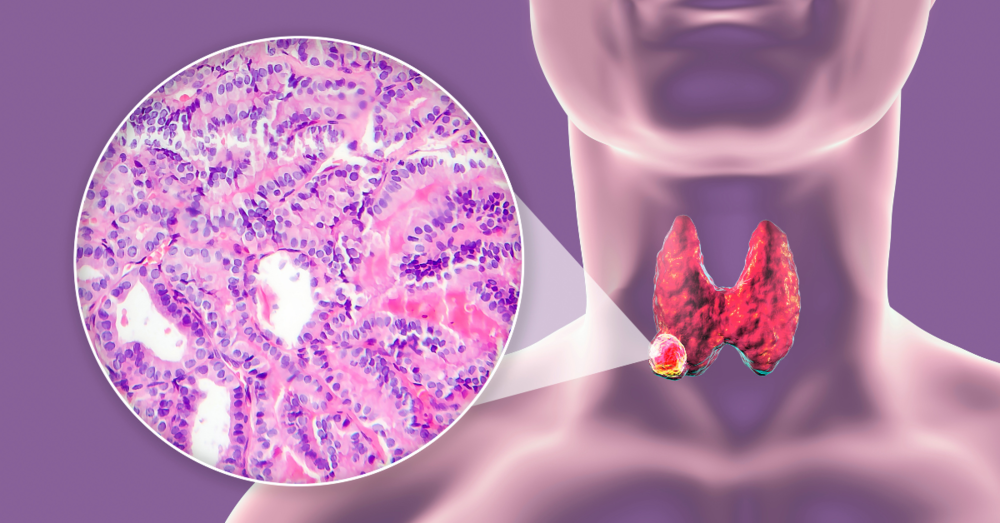Types of Thyroid Cancer: Understanding the Differences and Importance of Expert Care
At the Clayman Thyroid Center, our focus is on educating patients about the types of thyroid cancer to help in early diagnosis and effective treatment. Each type of thyroid cancer has distinct characteristics, risks, and treatment approaches. Understanding these differences allows patients to make informed decisions and seek specialized care, which can significantly impact outcomes.
Types of Thyroid Cancer: Understanding the Differences
.png)
Types of Thyroid Cancer: The Primary Types
- Papillary Thyroid Cancer
Papillary thyroid cancer, the most common type, accounts for about 80% of cases and generally has a good prognosis when treated early. This type tends to grow slowly, but specialized care can ensure complete removal and reduce the risk of recurrence. - Follicular Thyroid Cancer
Making up around 10-15% of thyroid cancers, follicular thyroid cancer can sometimes spread to other parts of the body, such as bones or lungs. Treatment often involves both surgery and, in some cases, additional therapy based on the spread of the cancer. - Medullary Thyroid Cancer (MTC)
Medullary thyroid cancer, a rarer type, originates in the thyroid’s C-cells and may be genetically linked. Because it’s often associated with genetic syndromes like multiple endocrine neoplasia (MEN), genetic testing is crucial in diagnosing and managing MTC. - Hurthle Cell Thyroid Cancer
Hurthle cell thyroid cancer, a subtype of follicular thyroid cancer, is known for its large cells with abundant granular cytoplasm. This type is relatively rare but more likely to spread than papillary cancer. Due to these characteristics, Hurthle cell cancer often requires a more aggressive treatment approach. - Anaplastic Thyroid Cancer
The rarest and most aggressive type, anaplastic thyroid cancer, grows quickly and requires immediate treatment. Due to its challenging nature, anaplastic cancer is managed with a comprehensive, often multimodal treatment plan.
Diagnosing Types of Thyroid Cancer
Accurate diagnosis of the types of thyroid cancer often involves a combination of techniques:
- Ultrasound and Imaging: Ultrasound is typically the first diagnostic tool, as it helps identify suspicious characteristics. Additional imaging, such as CT or MRI, may be needed, especially in cases of invasive types like anaplastic or substernal goiters.
- Fine-Needle Aspiration (FNA) Biopsy: An FNA biopsy is commonly used to collect cells from a thyroid nodule, helping pathologists determine the cancer type. FNA is particularly useful in differentiating between papillary, follicular, and Hurthle cell cancers.
- Molecular Testing: For certain cancers like medullary thyroid cancer, molecular testing and genetic analysis can help identify genetic mutations, which may influence the treatment approach.
- Blood Tests: While blood tests aren’t diagnostic for most types of thyroid cancer, calcitonin levels are useful markers for medullary thyroid cancer. Elevated levels can indicate the presence of cancer or recurrence.
Treatment Options for Different Types of Thyroid Cancer
Treatment varies depending on the type and aggressiveness of the thyroid cancer, however thyroid cancer will almost always require surgery.
- Papillary and Follicular Thyroid Cancer: Treatment involves surgical removal of the affected thyroid tissue. Radioactive iodine therapy may be used post-surgery for cases with a higher risk of recurrence, as it can target residual thyroid cells. Surgical treatment for these types of thyroid cancer is often extremely successful.
- Medullary Thyroid Cancer: Treatment for MTC often includes surgery, and because it doesn’t respond to radioactive iodine, patients may need additional therapies, including targeted treatments, particularly if genetic testing reveals certain mutations.
- Hurthle Cell Thyroid Cancer: Due to its tendency to spread, Hurthle cell cancer can require a more extensive surgery, potentially followed by additional therapies. At the Clayman Thyroid Center, our experience with complex thyroid cancers ensures comprehensive care for patients facing this diagnosis.
- Anaplastic Thyroid Cancer: Anaplastic thyroid cancer demands a rapid and aggressive approach. Treatment may involve a combination of surgery, external beam radiation, and chemotherapy, depending on the tumor’s spread and size.
Why Expertise Matters in Treating All Types of Thyroid Cancer
Choosing a center with high expertise in diagnosing and treating all types of thyroid cancer is crucial. At the Clayman Thyroid Center, our high-volume practice and specialized focus on thyroid disease allow us to provide precise diagnosis and tailored treatment plans for each type of thyroid cancer.
Types of Thyroid Cancer: The Importance of Follow-Up
After treatment, ongoing follow-up is essential to monitor for any recurrence or to manage potential complications. Regular blood tests, imaging, and consultations help detect signs of recurrence early. The Clayman Thyroid Center’s comprehensive follow-up protocols support patients in maintaining long-term health and peace of mind.
Additional Resources
- Become our patient by filling out the form at this link.
- Learn more about The Clayman Thyroid Center here.
- Learn more about our sister surgeons at the Norman Parathyroid Center, and Carling Adrenal Center
- Learn more about the Hospital for Endocrine Surgery.